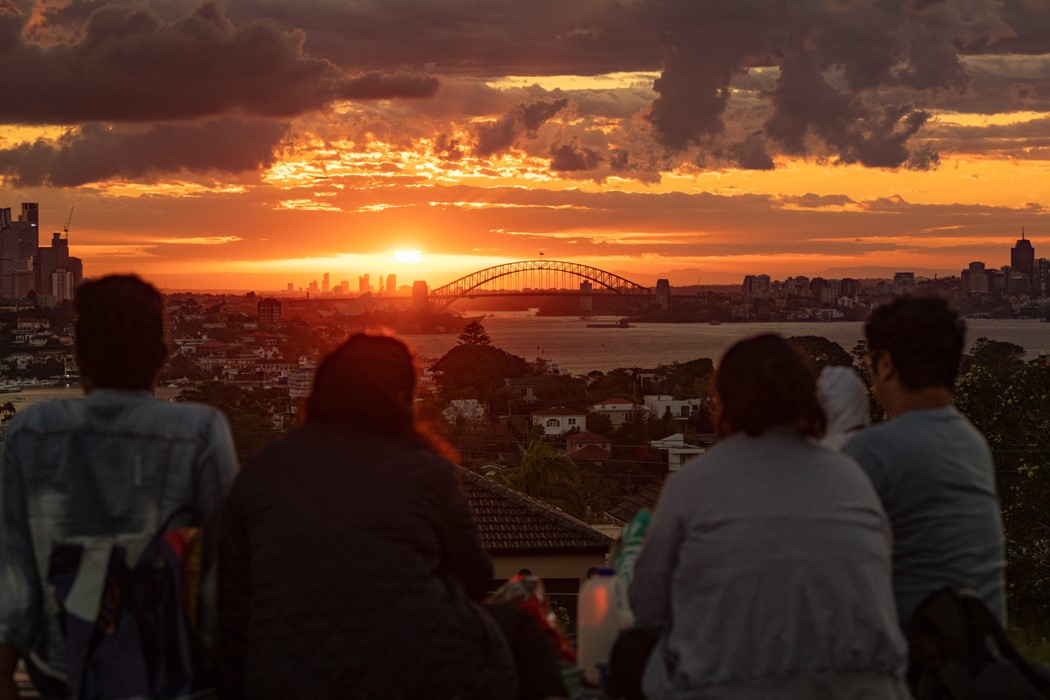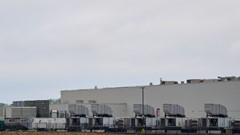Australia’s Economic ‘Miracle’ Is Ending No Matter Who Wins Vote
Apr 28, 2025 by Bloomberg(Bloomberg) -- Whoever wins Saturday’s Australian federal election will face an inescapable reality: The three pillars of the nation’s 30-year outperformance that gave rise to its “miracle economy” moniker are breaking down.
Rapid immigration, a surge in property wealth and China’s insatiable appetite for raw materials fueled a record stretch of developed world-beating growth. Now, the strains are setting in, leaving Labor Prime Minister Anthony Albanese and center-right opposition leader Peter Dutton pitching contrasting visions to an electorate seeing its living standards go backwards.

It’s an election that’ll be decided in seats such as Sydney’s Bennelong, where a surge in immigrants has worsened a housing crisis; rural electorates like the coal region of the Hunter that’s now grappling with the energy transition; and voting districts including Melbourne’s Kooyong, where a loose grouping of independents has emerged as a third player in Australian politics.
Polls suggest the May 3 election will be tight, with many pundits predicting the winner will lead a minority government, requiring smaller parties and independents to form a parliamentary majority. US President Donald Trump has hung heavily over the vote, with both Albanese and Dutton claiming they’re best placed to deal with his tariff salvos and America First agenda.

The economic tailwinds from China's emergence, rapid population growth and the dividends from reforms in decades past are fading, leaving whoever wins the election with a "herculean task" to convince the nation to shift course, according to James McIntyre at Bloomberg Economics.
"A change of gears is needed if the `lucky country' is going to keep enjoying the prosperity that many have come to expect," he said. “That means tackling challenging reforms that previous governments have shirked for a generation.''
But it’s bread-and-butter issues like rising energy prices, a chronic undersupply of housing, elevated grocery bills and high interest rates that have dominated the campaign as Albanese pitches cost-of-living relief while Dutton tries to lay the blame for the country’s woes at the prime minister’s feet.
While Australians aren’t alone in feeling the pinch, in the last couple of years they’ve fared worse than global peers. From the start of 2023 to late 2024, gross domestic product on a per-capita basis declined at a time when the average of OECD economies was steadily climbing. While Australia wasn’t in recession, its people were.

That’s opened the door for Dutton to potentially defeat a first-term government for the first time in almost a century. A recent poll showed one-in-two people expressed concern at what they saw as the Labor government’s failure to address the cost-of-living crisis.

Among those feeling the strain is Vanessa Cheng, who runs a Japanese-style cafe in West Ryde, roughly 16 kilometers (10 miles) northwest of Sydney’s CBD in the electorate of Bennelong. Since quitting her IT job to start the eatery back in 2023, she’s seen the cost of essentials from coffee beans to cocoa powder and eggs surge. Rising rent and energy bills compound that.
“It’s very challenging and my debts are only growing,” said Cheng, who is an undecided voter. “Sometimes I think why did I even start this cafe. It would have been easier 10 or 15 years ago.”
Cheng said she'd like to see more support for small businesses like hers, including easier regulatory and tax settings. She pointed out that her father, a first generation Chinese-Vietnamese immigrant, was able to buy a house and support his family without needing help from relatives.

She has given herself three years to turn her business around and repay money her father loaned to her. He also came to the rescue when Cheng needed a deposit to buy a house in Eastwood, a suburb dotted with Chinese and Korean restaurants and grocery stores a few minutes drive from her cafe.

Cheng’s story illustrates the difficulties confronting younger Australians. Based on the pre-Covid trajectory of per capita GDP, every Australian is now A$2,400 worse off each year than they would have been otherwise, estimates Jonathan Kearns, chief economist at Challenger Ltd. and previously a senior official at the nation’s central bank.

Bennelong, a Labor marginal seat, spans from the expensive Sydney harbor waterfront suburb of Greenwich in the north to Eastwood — popular with Chinese migrants — in the west. Data from Digital Finance Analytics show it’s among the top 10 electorates with both severe mortgage and rental stress, based on how much money households have left after expenses.

There are 22 seats held by Labor, minor parties and independents on a margin of less than 5%. If the Liberal-National Coalition can scoop up most of those, Dutton will be in a position to form government.
About 200 kilometers north of Cheng’s West Ryde cafe, the old Liddell power station towers over the surrounding landscape in the seat of Hunter. The generator is no longer functioning — the last unit was decommissioned in 2023 — yet it’s emblematic of an energy debate that’s gridlocked policy in Australia for almost 20 years and is again a significant issue in 2025.

The Labor government plans to transform Liddell into a green manufacturing hub, potentially for Australian-made solar panels, providing jobs for miners and other workers connected to the coal industry. Critical of an excessive reliance on green energy, Dutton has proposed embracing nuclear technology and pledged to turn Liddell into a reactor.
The energy impasse has left Australia with outdated power generators and soaring electricity prices. It’s an extraordinary position for a country endowed with almost every known source of energy: solar, wind, oil, gas, coal and uranium deposits. But the stop-start policy programs that shift with each change of government have hindered investment.
“There’s no road map,” said Kari Armitage, managing director of equipment supplier Quarry Mining. “We’re in that phase of trying to fly the plane and build it at the same time.”
Armitage, who wanted to keep her vote in Saturday's election private, said no matter who wins there needs to be a bipartisan consensus on energy policy, so that small companies like hers can adapt to the transition.

Jeff Drayton is the mayor of Muswellbrook, a town near Liddell where one-in-five employees worked in the coal industry at the 2021 census. He said there has been a lot of interest in new industries for the town, including green manufacturing, but without government support and policy consistency, the future remains deeply uncertain.
“We had a Danish industrial delegation over here, it took me quite a while to convince them that we still have two sides of politics who don’t agree on energy policy. They couldn’t believe it,” Drayton said in an interview in his office. “Their view was: ‘our government stopped arguing about energy policy 20 years ago.’”

Guy Debelle, deputy governor of the Reserve Bank until 2022, reckons Australia’s renewables industry could have wider significance than delivering clean energy, it could unlock a new era of economic growth.
“Some of the drivers of Australia’s past economic outperformance are beginning to dissipate,’’ he said, referring to a likely downward trajectory in Chinese demand for iron ore over the next decade.
“Improving productivity is an option, but it’s not easy to identify how this occurs,” Debelle said. “Australia’s clearest opportunity, where it’s fortuitously placed because of its vast natural advantages, is in green energy. We have the capacity to produce a lot of it — sun, land, wind.”

While Labor has been a keen adopter of renewable energy and emissions targets since at least 2007, the Liberal-National Coalition was slower to commit to net zero emissions by 2050 and recalcitrants remain.
Under the Coalition’s election platform, seven retiring coal plants will be transformed into nuclear reactors, supported by renewables, gas and storage. The opposition insists that it will restrain power prices by incentivizing gas exporters to keep some of their uncontracted fuel in Australia in a bid to keep a lid on those prices.
In the four years through 2024, average nationwide wholesale electricity prices increased about 60%, according to the Australian Energy Regulator. The government has sought to cushion this blow with rebates to households, but it has taken a toll in an inflationary environment with elevated interest rates.

Green policies and the more prosaic hip-pocket issues are front of mind for voters in the leafy and gentrified suburbs comprising the Melbourne electorate of Kooyong. The sitting member, former pediatric neurologist Monique Ryan, and her fellow so-called Teal independents around Australia are pressing for the government to push harder on clean energy.
The Teals are backed by Climate 200, founded by financier Simon Holmes a Court. In the lower house of parliament, a handful of Teals, all women, have succeeded in ousting sitting Liberal members, hiving off much of the moderate wing of the center-right party.
The Teals have sought to broaden their program from clean energy to tax reform and other measures to make the economy more efficient. Ryan and her Teal colleagues are calling for indexation of tax thresholds to inflation in order to avoid “bracket creep,” when wage earners are pushed up to higher levels of taxation as prices and incomes increase.
While the Teals have sought to paint themselves as new and above the political fray, Kooyong’s Ryan and her husband were forced to apologize late last month after he was caught on video removing a campaign sign for her Liberal challenger from outside a Melbourne home.
If they keep their seats, the Teals may turn out to be kingmakers. While Labor has reversed its deficit with the coalition, leading 52% to 48% in the latest polls, many pundits predict a hung parliament. “A minority Labor government with Teals holding the balance of power may actually not be a bad thing because they have centrist policies,” said Challenger’s Kearns.
Whatever the outcome — a Labor majority win, an unlikely outright Coalition victory, or minority government formed by either — the winner will face increased pressure to deliver policies that can revive the nation’s stalling growth engines.
“Australia should be an optimistic country, open to the world, globally competitive,” Ken Henry, a former treasury secretary, wrote in an opinion article last month. “To secure that vision, we need an economic policy transformation. Kicking the policy reform can down the road simply won’t do it.”
(AI summary was removed due to inaccuracy.)
©2025 Bloomberg L.P.
By


















